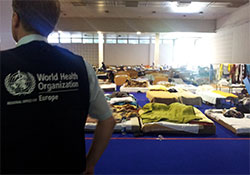Balkans floods: emergency supplies arrive

WHO/Miljana Grbic
Following the severe flooding in Bosnia and Herzegovina, Croatia and Serbia in May, water levels have been falling in most areas, but stagnating in some. The transition from the response phase to the recovery phase is underway: families are returning to their homes to begin to clean and repair them.
More than 50 health facilities have been damaged, and health services have been disrupted. Significant infrastructure damage hampers the supply of water in large parts of the affected areas.
No disease outbreaks have been reported in the last week, and local and national health authorities are conducting enhanced epidemiological surveillance.
WHO/Europe has established an emergency response team to support all three countries.
Emergency supplies arrive
Two water purification and storage units are now in place in Doboj and Odzak, two of the worst-affected areas in Bosnia and Herzegovina. They can produce up to 96 000 L drinking-water per day, supplying 4800 people.
WHO has delivered five Interagency Emergency Health Kits (IEHKs) with medicines and supplies to cover the health needs of 150 000 people for one month: two each to Bosnia and Herzegovina and Serbia, and one to Croatia. In addition, Croatia received one diarrhoeal disease kit and one water purification kit; Serbia also received a water purification kit. WHO provided these kits with financial support from Italy, Norway and the Russian Federation.
Other WHO activities
WHO experts – in emergency preparedness and response, environmental health, water and sanitation, chemical hazards, food safety and communicable diseases – remain in the affected countries to support local and national health authorities.
In addition, 75 000 leaflets with public health advice were distributed in Croatia and Serbia. With the European Centre for Disease Prevention and Control, WHO is providing technical advice on mosquito-control measures in all three countries.
The Government of Norway has pledged Nkr 5 million to support WHO’s activities in Serbia, and further financial support is needed.



